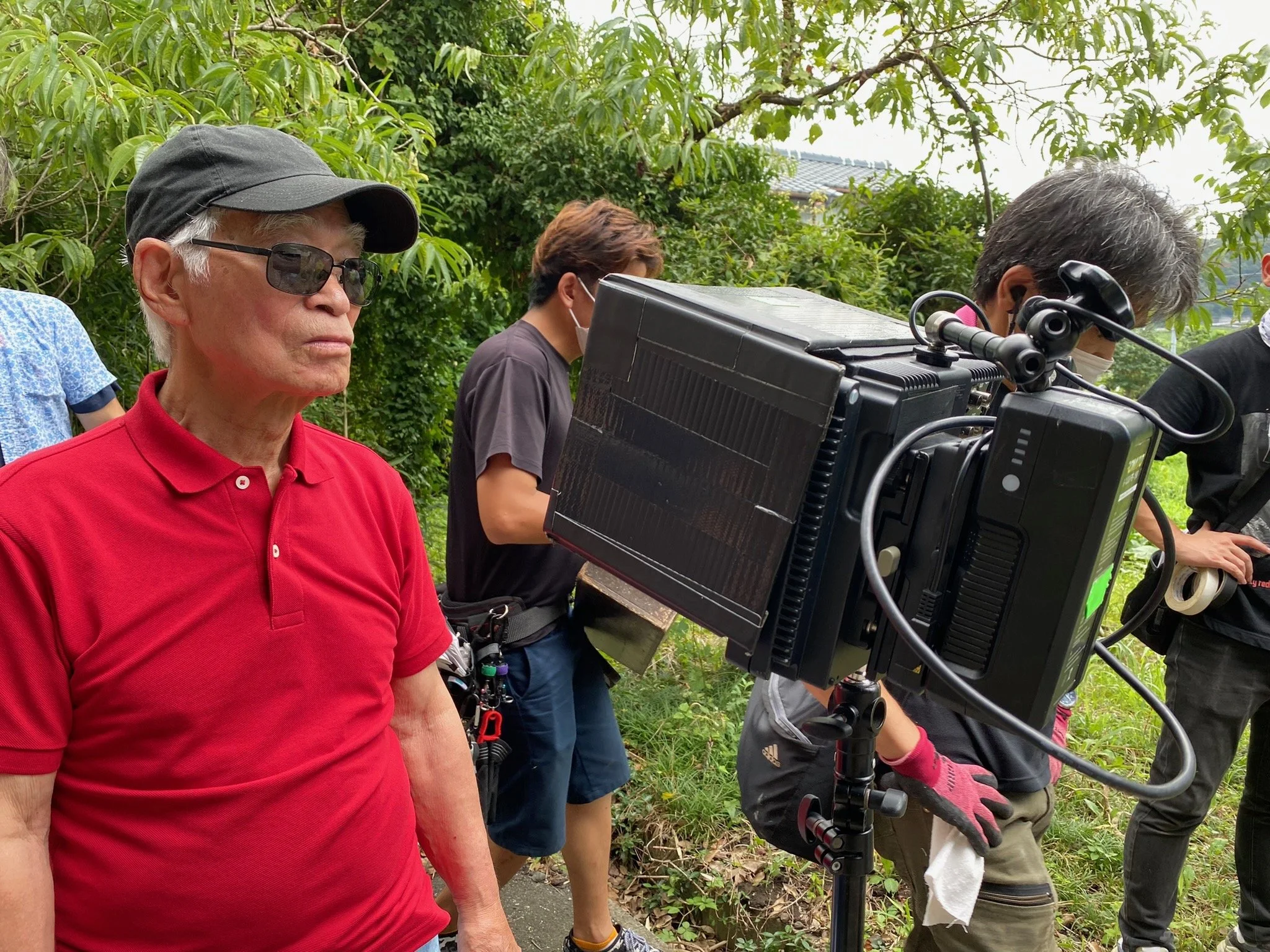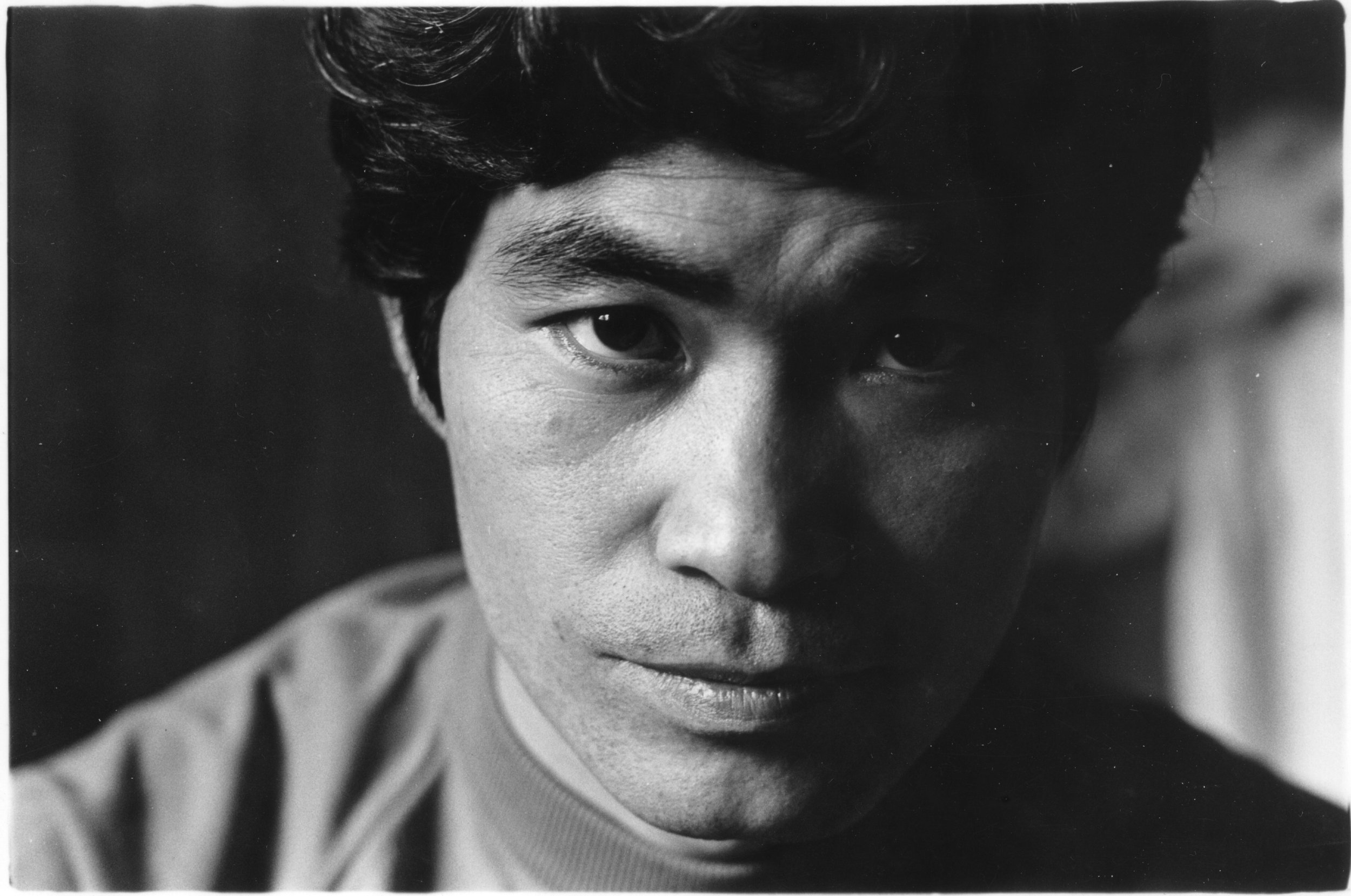©Masao Adachi.
Live Online Event
Stepping Out of Politics: Films by Masao Adachi
EST / 10/29/22, 10:00 am
JST / 10/29/22, 11:00 pm
CEST / 10/29/22, 4:00 pm
Free with Registration
CCJ’s Go Hirasawa once again welcomes Masao Adachi in a live discussion on the occasion of two online screenings we will present in October and November. Join us for this special occasion to hear a deep dive interview with Masao Adachi by Go Hirasawa, with Julian Ross as the translator and discussant.
CCJの10月と11月のオンライン上映の機会ををもちまして映画研究者、平沢剛が映画作家足立正生とオンライン対談をします。日本語の対談で行われ、通訳とディスカサントにジュリアン・ロスも参加します。
Upcoming Screenings
10/27-11/6
Sex Jack (1970), Directed by Koji Wakamatsu; Screenplay by De Deguchi (Masao Adachi)
11/3-11/13
Female Student Guerrilla (1969), Directed by Masao Adachi
Each program will be available for viewing on CCJ’s viewing platform.
Filmmaker Masao Adachi has been reexamined in various parts of the world since the 2010 all-works retrospective organized by the Cinémathèque Française and the French publication of the collection of his speeches. After co-directing Closed Vagina (1963) as a member of the Nihon University Film Study Club (Nichidai Eiken), he participated in Wakamatsu Production and mass produced screenplays for pink films such as Embryo (1966), Go, Go Second Time Virgin (1969), while making his pink film debut with Abortion (1966). On the other hand, he also made experimental films such as Galaxy (1967) and AKA: Serial Killer (1969). After participating in the Cannes Film Festival with Sex Jack (1970) and other films, traveled to Lebanon and made Red Army/PFLP: Declaration of World War (1971) which became a turning point to dedicate himself to the Palestinian revolution and became a member of the Japanese Red Army. After four and a half decades later, in 2001, he was deported and sent back to Japan. Upon return, Adachi made new works such as Prisoner/Terrorist (2006) and Artist of Fasting (2015). Adachi’s avant-garde creation across art, film, and politics is extremely unique, which continues today with his most recent film Revolution+1 (2022-2023), a film that depicts Tetsuya Yagami who assassinated the former prime minister Shinzo Abe.
This program will discuss Sex Jack, which Adachi wrote its screenplay and was directed by Koji Wakamatsu, and Female Student Guerrilla (1969), directed by Adachi. These films fall under the so-called pink film, softcore pornography genre, but at the time of their release they were screened in pink film theaters as well as in art theaters. These films’ subjects are on politics and revolution. What is painted there are the philosophical questions of what is politics, what is revolution, and by extension, the questions of what is film, what is media itself.
Through this online talk event with Masao Adachi on October 29th, I’d like to discuss the two films, as well as their relation to his newest work.
Go Hirasawa
足立正生という映像作家は、2010年のシネマテーク・フランセーズでの全作品特集とフランスでの発言集の刊行以降、世界各地で国際的な再評価が進められている。前衛芸術家たちと交流しながら、日本大学芸術学部映画研究会において、『鎖陰』(1963)などを共同監督したのち、若松プロダクションに参加し、『胎児が密猟するとき』(1966)、『ゆけゆけ二度目の処女』(1969)などの実験的なピンク映画の脚本を量産し、自らも『堕胎』(1966)でピンク映画デビューを果たした。その一方で、『銀河系』(1967)、『略称・連続射殺魔』(1969)などの実験的作品も継続した。カンヌ国際映画祭に、『セックスジャック』(1970)などで参加した帰途でレバノンに渡り、『赤軍・PFLP-世界戦争宣言』(1971)を製作したことを契機に、パレスチナ革命に身を投じ、日本赤軍の結成に参加、四半世紀ののち2001年に日本へ強制送還された。帰国後には、『幽閉者』(2007)、『断食芸人』(2016)といった新たな作品を生み出した。足立の芸術、映画、政治の前衛を横断していく歩みは極めて特異なものであるが、さらに現在は、日本の前首相の安倍晋三を射殺した山上徹也を描いた『Revolution+1』(2022-23)が大きな話題を集めている。
今回のプログラムでは、足立脚本による若松孝二監督作『セックスジャック』、足立監督作『女学生ゲリラ』(1969)を紹介する。これらはピンク映画と呼ばれるソフトコアポルノのジャンルにあたるが、当時の足立ー若松映画はピンク映画の専門館での公開と同時に、アートシアターでの上映も行われていた。そして、これらは政治や革命が主題とされているが、そこで描かれているのは、政治とは何か、革命とは何かという哲学的な問いであり、ひいては映画という芸術、メディア自体への問いである。
10月29日には、足立正生を招いたオンライン・トークイベントを開催し、二作品について、また最新作との関わりについても議論していきたい。
平沢剛
Go Hirasawa, Meiji Gakuin University (Tokyo)
Go Hirasawa is a researcher at Meiji-Gakuin University working on underground and experimental films and avant-garde art movements in 1960s and '70s Japan. His publications include Godard (Tokyo, 2002), Fassbinder (Tokyo, 2005), Cultural Theories: 1968 (Tokyo, 2010), Koji Wakamatsu: Cinéaste de la Révolte (Paris, 2010), and Masao Adachi: Le bus de la révolution passera bientot près de chez toi (Paris, 2012). He has organized more than fifty film exhibitions throughout the world, including Underground Film Archives (Tokyo, 2001), Nagisa Oshima (Seoul Art Cinema, 2010), Koji Wakamatsu and Masao Adachi (Cinematheque Française, 2010), Theatre Scorpio: Japanese Independent and Experimental Cinema of the 1960s (Close-Up: London, 2011), and Art Theater Guild and Japanese Underground Cinema, 1960–1986 (The Museum of Modern Art, New York, 2012).
Julian Ross, Leiden University in LUCAS, the Centre for the Arts in Society
Julian Ross is a Lecturer at Leiden University in LUCAS, the Centre for the Arts in Society. His recent publications include book chapters and articles in The Japanese Cinema Book (BFI, 2020), America: Films from Elsewhere (The Shoestring Publisher, 2019) and Japanese Expanded Cinema Revisited (Tokyo Photographic Art Museum, 2017). As a curator, he has presented curatorial projects related to Japanese expanded cinema at Tate Modern, BOZAR Centre for Fine Arts and Art Institute of Chicago. He was a curatorial advisor for the exhibition Japanese Expanded Cinema Revisited at Tokyo Photographic Art Museum and is a Core Research Group member of Collaborative Cataloging Japan.


